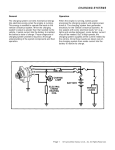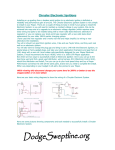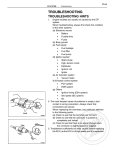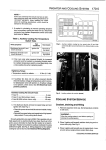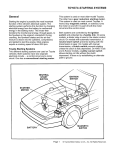Download 10 TROUBLESHOOTING
Transcript
TROUBLESHOOTING VOLTAGE CHECK (a) Establish conditions in which voltage is present at the check point. Example: (b) – Ignition SW on – Ignition SW and SW 1 on – Ignition SW, SW 1 and Relay on (SW 2 off) Using a voltmeter, connect the negative lead to a good ground point or negative battery terminal, and the positive lead to the connector or component terminal. This check can be done with a test light instead of a voltmeter. CONTINUITY AND RESISTANCE CHECK (a) (b) Disconnect the battery terminal or wire so there is no voltage between the check points. Contact the two leads of an ohmmeter to each of the check points. If the circuit has diodes, reverse the two leads and check again. When contacting the negative lead to the diode positive side and the positive lead to the negative side, there should be continuity. When contacting the two leads in reverse, there should be no continuity. (c) 10 Use the volt/ohmmeter with high impedance (10 kΩ/V minimum) for troubleshooting of the electrical circuit. FINDING A SHORT CIRCUIT (a) Remove the blown fuse and disconnect all loads of the fuse. (b) Connect a test light in place of the fuse. (c) Establish conditions in which the test light comes on. Example: – Ignition SW on – Ignition SW and SW 1 on – Ignition SW, SW 1 and Relay on (Connect the Relay) and SW 2 off (or Disconnect SW 2) (d) Disconnect and reconnect the connectors while watching the test light. The short lies between the connector where the test light stays lit and the connector where the light goes out. (e) Find the exact location of the short by lightly shaking the problem wire along the body. CAUTION: Do not open the cover or the case of the ECU unless absolutely necessary. (If the IC terminals are touched, the IC may be destroyed by static electricity.) DISCONNECTION OF MALE AND FEMALE CONNECTORS To pull apart the connectors, pull on the connector itself, not the wire harness. HINT: Check to see what kind of connector you are disconnecting before pulling apart. 11 TROUBLESHOOTING HOW TO REPLACE TERMINAL (with terminal retainer or secondary locking device) 1. PREPARE THE SPECIAL TOOL HINT: To remove the terminal from the connector, please construct and use the special tool or like object shown on the left. 2. DISCONNECT CONNECTOR 3. DISENGAGE THE SECONDARY LOCKING DEVICE OR TERMINAL RETAINER. (a) Locking device must be disengaged before the terminal locking clip can be released and the terminal removed from the connector. (b) Use a special tool or the terminal pick to unlock the secondary locking device or terminal retainer. NOTICE: Do not remove the terminal retainer from connector body. For Non–Waterproof Type Connector HINT: The needle insertion position varies according to the connector’s shape (number of terminals etc.), so check the position before inserting it. “Case 1” Raise the terminal retainer up to the temporary lock position. “Case 2” Open the secondary locking device. 12 For Waterproof Type Connector HINT: Terminal retainer color is according to connector body. different Example: Terminal Retainer: Connector Body Black or White : Gray Black or White : Dark Gray Gray or White : Black “Case 1” Type where terminal retainer is pulled up to the temporary lock position (Pull Type). Insert the special tool into the terminal retainer access hole ( Mark) and pull the terminal retainer up to the temporary lock position. HINT: The needle insertion position varies according to the connector’s shape (Number of terminals etc.), so check the position before inserting it. “Case 2” Type which cannot be pulled as far as Power Lock. 13 TROUBLESHOOTING Insert the tool straight into the access hole of terminal retainer as shown. Push the terminal retainer down to the temporary lock position. (c) 4. Release the locking lug from terminal and pull the terminal out from rear. INSTALL TERMINAL TO CONNECTOR (a) Insert the terminal. HINT: 1. Make sure the terminal is positioned correctly. 2. Insert the terminal until the locking lug locks firmly. 3. Insert the terminal with terminal retainer in the temporary lock position. (b) 5. 14 Push the secondary locking device or terminal retainer in to the full lock position. CONNECT CONNECTOR





